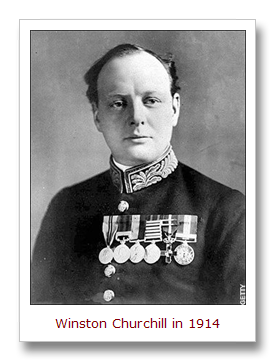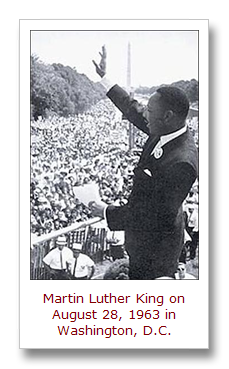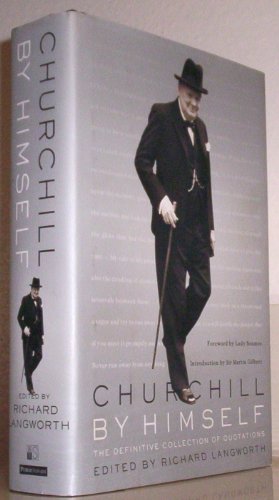It’s not uncommon to see credible sources claim that the phrase “business as usual” was coined by Winston Churchill.
For example, a glossary of World War I words and phrases on the BBC website says: “Business as Usual: Phrase coined by Churchill to suggest how British society should react to the wartime situation.”
Even some history books, such as A History of the World from the 20th to the 21st Century by J.A.S. Grenville, make that claim.
The truth is, Churchill helped popularize the phrase but he didn’t coin it.
It began appearing in newspapers and books as far back as the mid-1700s (as shown by this search using Google Ngram, a research tool that shows the appearance of words or phrases in thousands of digitized books).
The original use was literal. When a store reopened after some unusual event, like a fire, the owner would put up a sign saying “Open for business as usual.” Or, on some unofficial holiday, newspapers might report that banks would be open for business as usual.
Churchill’s use came early in World War I. On August 4, 1914, Great Britain officially that bloody fray by declaring war on Germany. At the time, Churchill was First Lord of the Admiralty, a top position in the British Navy.
He and other British military leaders, politicians and businessmen initially assumed that Germany could be defeated quickly with Britain’s existing naval and army forces. Thus, they felt there was no need for a mass recruitment of volunteers or other actions that would disrupt the country’s labor force and economy. Indeed, they argued against any such government “interference” on the home front.
On the day war was declared, British Cabinet Minister David Lloyd George met with a group of bankers and assured them that the policy of the British government was “to enable the traders of this country to carry on business as usual.”
Many prominent businessmen heartily endorsed that policy and began repeating “business as usual” as a slogan.
For example, Henry E. Morgan, who worked as both an executive for the W.H. Smith publishing company and as an advertising consultant to retail store magnate Harry Gordon Selfridge, used it in a letter to the editor published in the Daily Chronicle on August 11, 1914. Some sources have wrongly credited Morgan with coining the phrase.
Around that time, Selfridge adopted “business as usual” as his catchphrase and he is often credited with coining it. Meanwhile, Harrods department store chain also began using the phrase in newspaper advertisements, leading some sources to credit Harrods with launching the phrase. Soon, other stores and shops began displaying “Business As Usual” signs to show their support for the government’s “non-interference” policy.
Winston Churchill further popularized the phrase by using it a speech he gave on November 9, 1914. As noted by many books of quotations, Churchill said in that speech:
“The British people have taken for themselves this motto – ‘Business carried on as usual during alterations on the map of Europe.’”
This “non-interference” policy was fully embraced by the British government under Prime Minister H. H. Asquith, as David Lloyd George told the bankers in August. Unfortunately, it turned out to be far too optimistic.
By 1915, the UK was forced to recruit hundreds of thousands of volunteers and in 1916 imposed a draft on single men aged 18 to 41. This soon led to serious labor shortages and other disruptions of the economy.
Churchill’s use of “business as usual” during World War I was remembered and repurposed during World War II, when he served as Prime Minister and lead Great Britain in it’s fight against Nazi Germany.
The famed speeches Churchill made during those years are known for their combination of defiance and hope.
In the early 1940s, when German planes were making devastating nightly bombing raids on London, store owners put up homemade notices and signs on their bombed shops that said “Business As Usual.” Like the speeches Churchill gave during World War II, they were a message of both defiance and hope.
In the decades following World War II, the phrase has been used to mean maintaining the status quo, sometimes in a matter of fact way but often with a negative connotation.
For example, in 1962, the famed “Port Huron Statement” adopted by the Students for a Democratic Society (SDS) condemned the typical college campus as “a place of commitment to business-as-usual.”
The following year, the phrase was used in a similar negative way by civil rights leader, Martin Luther King.
In his moving “I Have a Dream” speech on August 28, 1963 in Washington D.C., King said of the race riots that had recently swept America’s urban areas:
“Those who hope that the Negro needed to blow off steam and will now be content will have a rude awakening if the nation returns to business as usual.”
Today, “business as usual” continues to be used in both a positive and negative sense and as sarcasm, making it an unusually flexible idiomatic expression.
* * * * * * * * * *
Comments? Corrections? Post them on the Famous Quotations Facebook page.
Related reading and listening…









